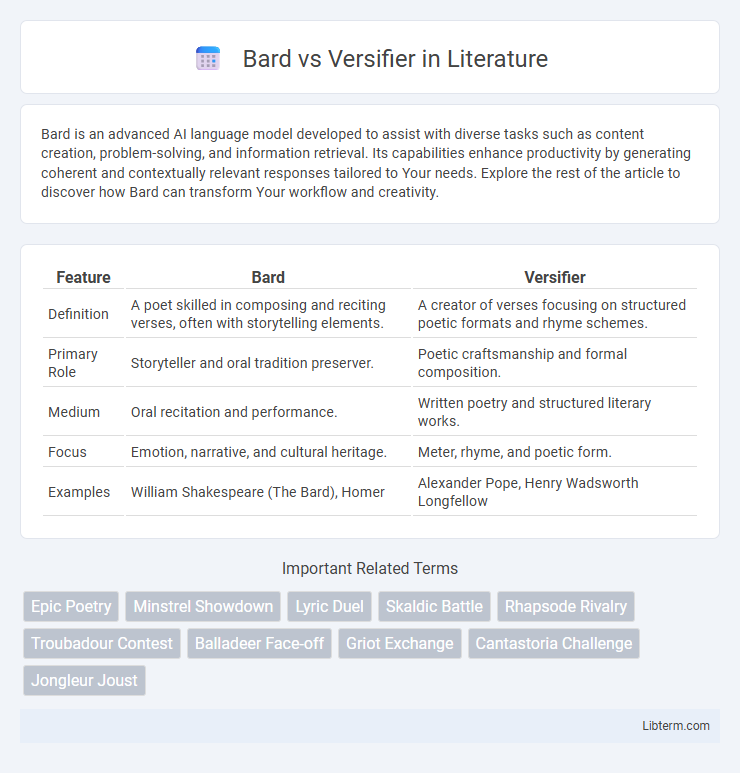Bard is an advanced AI language model developed to assist with diverse tasks such as content creation, problem-solving, and information retrieval. Its capabilities enhance productivity by generating coherent and contextually relevant responses tailored to Your needs. Explore the rest of the article to discover how Bard can transform Your workflow and creativity.
Table of Comparison
| Feature | Bard | Versifier |
|---|---|---|
| Definition | A poet skilled in composing and reciting verses, often with storytelling elements. | A creator of verses focusing on structured poetic formats and rhyme schemes. |
| Primary Role | Storyteller and oral tradition preserver. | Poetic craftsmanship and formal composition. |
| Medium | Oral recitation and performance. | Written poetry and structured literary works. |
| Focus | Emotion, narrative, and cultural heritage. | Meter, rhyme, and poetic form. |
| Examples | William Shakespeare (The Bard), Homer | Alexander Pope, Henry Wadsworth Longfellow |
Introduction to Bard and Versifier
Bard is an AI language model developed by Google designed to generate human-like text and engage in dynamic conversations using advanced natural language processing techniques. Versifier is a specialized AI tool aimed at creating structured poetry and verse with a focus on rhyme schemes and meter, catering to creative literary tasks. Both platforms leverage machine learning algorithms, but Bard emphasizes versatile dialogue generation, while Versifier targets artistic expression through poetic form.
Historical Background of Bards and Versifiers
Bards originated in ancient Celtic cultures as esteemed poets and musicians who preserved oral traditions and historical events through song and verse. Versifiers, emerging in medieval Europe, specialized in composing structured poetic works that often adhered to formal meter and rhyme schemes, serving both artistic and didactic purposes. The historical significance of bards lies in their role as cultural historians, while versifiers contributed to the codification and evolution of poetic forms.
Core Definitions: What is a Bard? What is a Versifier?
A Bard is a traditional poet and storyteller, often associated with ancient cultures, who composes and recites epic poems, preserving oral history and cultural heritage through lyrical and narrative artistry. A Versifier, in contrast, is someone who composes verses or poetry but is typically seen as less inventive, focusing on mechanical or formulaic construction of rhyme and meter rather than profound artistic expression. The core difference lies in the Bard's role as a cultural custodian and creative genius versus the Versifier's emphasis on technical skill in verse-making.
Key Differences Between Bard and Versifier
Bard specializes in generating creative, poetic text with a strong emphasis on emotion and storytelling, while Versifier focuses on structured rhyme and meter, producing formal poetry aligned with classic poetic forms. Bard uses advanced natural language processing models to craft imaginative, free-flowing verses, whereas Versifier employs algorithms designed to maintain strict rhythmic and rhyming patterns. The key difference lies in Bard's flexibility for creative expression contrasted with Versifier's precision in poetic structure and adherence to traditional verse conventions.
Roles and Functions in Literature
Bard serves as a traditional oral poet and storyteller, often composing and reciting epic poems that preserve cultural myths and histories through performance. Versifier primarily functions as a craftsman of structured poetry, focusing on meter, rhyme, and formal techniques to create written verse. While the Bard emphasizes oral transmission and communal memory, the Versifier concentrates on literary form and textual artistry within written literature.
Artistic Approach: Creativity vs Technique
Bard emphasizes organic creativity, prioritizing imaginative expression and emotional resonance in its artistic approach, allowing for nuanced storytelling that evokes deep emotional connections. Versifier, in contrast, focuses on technical precision and structured composition, leveraging formal poetic techniques and complex meter patterns to achieve rhythmic and stylistic consistency. This distinction highlights Bard's strength in fostering creative originality while Versifier excels in mastering poetic form and craftsmanship.
Cultural Significance and Influence
Bard and Versifier hold distinct cultural significance rooted in their historical roles in literature and society. The Bard, epitomized by figures like William Shakespeare, symbolizes the pinnacle of poetic and dramatic artistry, shaping Western literary traditions and influencing cultural narratives for centuries. Versifiers, often regarded as skilled but less celebrated poets, contributed to the popularization and accessibility of poetry, enriching cultural heritage by preserving oral traditions and reflecting everyday experiences.
Famous Examples of Bards and Versifiers
William Shakespeare stands as a quintessential example of a bard, whose poetic dramas have immortalized English literature. Alexander Pope exemplifies a masterful versifier, renowned for his precise and elegant use of heroic couplets in works like "The Rape of the Lock." Their contributions highlight the bard's role in storytelling through epic poetry and the versifier's focus on structured, rhythmic verse crafting.
Impact on Modern Creative Writing
Bard and Versifier represent distinct approaches in modern creative writing, with Bard utilizing advanced AI to generate poetic and narrative content that enhances creativity and productivity for writers. Versifier focuses on structured verse creation, enabling precise meter and rhyme schemes that appeal to traditional poetic forms while integrating digital tools for innovation. The impact of these technologies lies in expanding creative possibilities, automating labor-intensive tasks, and fostering new literary expressions in the digital age.
Conclusion: Choosing Between Bard and Versifier
When deciding between Bard and Versifier, prioritize the intended use case: Bard excels in creative and conversational AI applications with its advanced natural language understanding, while Versifier is optimized for structured poetic compositions and rhyme schemes. Consider integration capabilities, as Bard offers broader API support for diverse applications whereas Versifier specializes in refined verse generation. Evaluating these factors ensures selecting the most suitable tool for creative writing or automated poetry tasks.
Bard Infographic

 libterm.com
libterm.com